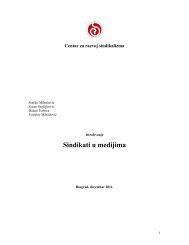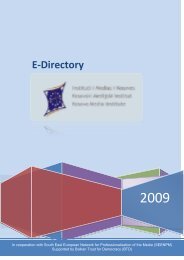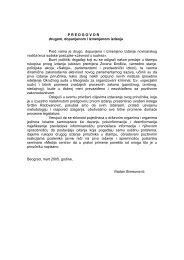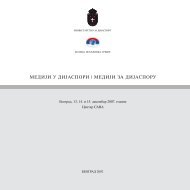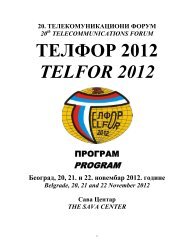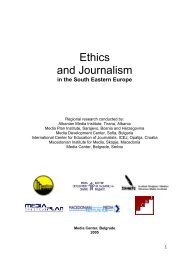Media Study - Medija centar Beograd
Media Study - Medija centar Beograd
Media Study - Medija centar Beograd
Create successful ePaper yourself
Turn your PDF publications into a flip-book with our unique Google optimized e-Paper software.
a draft law 14 . In order to qualify as public service, these services must be based on journalistic-editorial needs and<br />
be edited in a journalistic manner. 15<br />
The mission statements for public broadcasters as they appear under the law are slightly more detailed in Serbia<br />
than they are in other countries. However, in a country like Germany, the public broadcasters are required to<br />
report biannually to the broadcasting council on the implementation of the program guidelines.<br />
From these three countries, inspiration can be gained for new media practices in Serbia such as that the<br />
broadcasters should publish the general principles of their programming and profiles at least annually in advance in<br />
order to make clear how they intend to meet the public service obligations and how this is reflected in the<br />
broadcast programme. In addition, this broadcast programme could be presented to an Advisory Programme Board<br />
as is the procedure in Germany. A German Programme Board can request changes and amendments without<br />
infringing upon editorial freedom. The draft broadcast programme along with the amendments requested by the<br />
Programming Board, should then be approved by the Broadcasting Council, which will determine whether the<br />
revised draft meets the public service obligation. If public financing is linked to public service obligations, this<br />
procedure may serve as a basis for establishing the required budget of the broadcaster. In Denmark the public<br />
broadcasters, Denmark’s Radio and TV2 Denmark, are required to deliver an annual account of their public service<br />
broadcasting to document that they have fulfilled the public service obligations in their programmes.<br />
Collection of license fees<br />
Currently, public financing of public broadcasting is based on user contribution 16 , internationally often called<br />
license fees (in Serbia radio-television subscription according to the Broadcasting Law, Article 81), which is due<br />
14 http://www.parlament.gv.at/PG/DE/XXIV/ME/ME_00115/imfname_171534.pdf .<br />
15 They are further subject to a three criteria test which aims at justifying the budgeting of users’ contributions (license fees) for these programs.<br />
Promoting media literacy within the meaning of the AVMS – Directive is also a policy goal for public broadcasters in many EU Member States.<br />
16 The question whether contributions user license fees are indeed a means of state subsidy is still not clarified: Subsidy is any advantage which<br />
the state grants license fees to an entrepreneurial entity. The EU Commission holds that user fees are a state subsidy as the state mandates the<br />
collection by law (and in the case of Germany, the fees are collected by an entity with the status of a public authority, the GEZ). By contrast, the<br />
European Court of Justice (ECJ) has ruled in 2001 (Preussen Elektra case), that a state subsidy entails state control over those means, i.e. if the<br />
means flow directly from a state budget or are granted by state institutions. Thus, there is no clear answer whether license fees are state<br />
subsidies. However, the question of such fees has not yet been explicitly addressed by the ECJ.<br />
In 2005, the EU Commission dealt with a complaint by an association of private broadcasters concerning the license fees in Germany (alleged<br />
lack of transparency in distribution, online offers of public broadcasters, selling of sports events). The Commission requested a clear definition of<br />
the concept of ‘Comprehensive Coverage’, separate accounting for commercial and public mission programming, and other measures to prevent<br />
cross subsidizing. Although the question whether license fees constitute a subsidy remain discussion to date The specific complaint was settled,<br />
as Germany made major concessions:<br />
The extent to which additional digital channels and online offers serve public the interest must be specified;<br />
In relation to online offers, there will be a 3-step test for new or modified services similar to the BBC’s public value test, although less<br />
economically oriented:<br />
o Is the offer part of the public service<br />
o To which extent will the service contribute to the quality of publicist competition<br />
o Which financial burden does the service involve.<br />
The broadcaster launches a public hearing and decides on the basis of the comments and of independent expertise whether the threecriteria<br />
test is met.<br />
25



